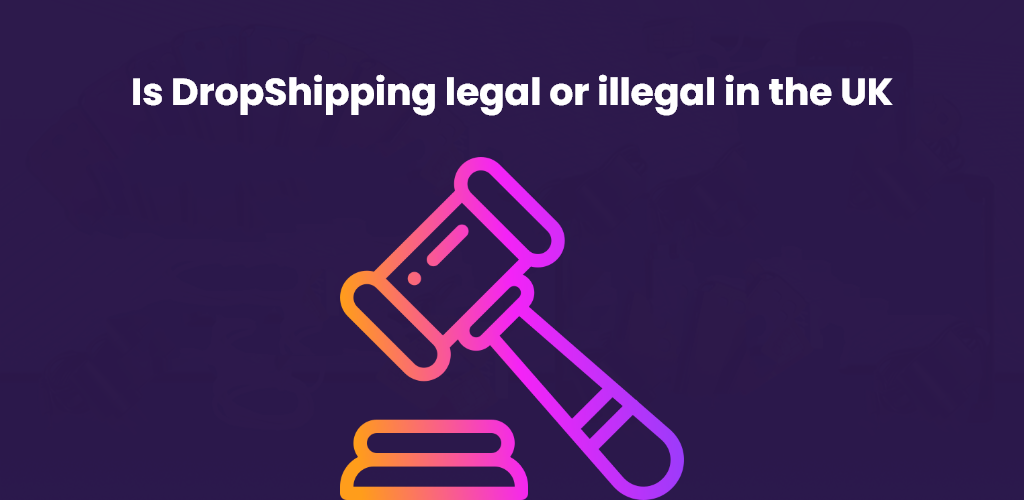Is DropShipping legal or illegal in the UK?
People that are new to the eCommerce industry often ask whether DropShipping is illegal in the UK – and there are a lot of misconceptions when it comes to DropShipping. The fact that there is so much content that sounds questionable doesn’t help; videos claiming to make huge amounts of money within a month are often wildly inaccurate and simply clickbait to get people to view their content.
Despite the misinformation contained in a lot of content about DropShipping, there is nothing illegal about DropShipping, which is why Avasam exists; we’re helping businesses to do DropShipping better, and to avoid those methods that simply don’t make sense. In this post, we’re having a look at what you need to know about DropShipping in terms of legal stuff and complexities, with a few things to bear in mind, even though DropShipping is legal here in the UK.
Before we dive in, we’ll preface this post by saying that although we’re experts in DropShipping, and helping sellers and suppliers to do DropShipping successfully, we’re not legal experts, or legally qualified. So while the information we’re sharing in this post is accurate as far as we are aware, be certain to carry out your due diligence on marketplaces in the UK or worldwide, so you can avoid any potential stumbling blocks.
Is DropShipping legal in the UK?
Let’s get straight to the point – DropShipping is simply a retail fulfilment method that is legal here in the UK. As we’ve already mentioned, people are often suspicious of DropShipping because some content providers make it sound too good to be true with their videos that include sports cars and flashy homes. DropShipping is legal, and it can be used to create a business that makes a good amount of profit – with the right strategies, of course.
Is DropShipping illegal anywhere in the world?
There doesn’t seem to be any countries that have banned DropShipping, and we’re not sure why they would! Having said that, there are definitely countries where it will be more hassle than it might be worth in sales. Any countries that are currently in conflict, where courier services are less reliable, or where there are strict laws around certain types of products may not be suitable for businesses to operate in.
However, despite our research showing there doesn’t seem to be anywhere that has banned DropShipping, as we said at the start of this post, we’re not lawyers, and we’re certainly not international lawyers, so be certain to do your own research before you jump into DropShipping anywhere in the world. As always, you should always do your due diligence before you start operating in a different country.
Is DropShipping allowed on marketplaces?
It would be wrong of us to generalise to all marketplaces, because each online marketplace has their own terms and conditions, and set their own rules. But, broadly speaking, DropShipping is usually allowed – although there are things to know. Selling branded items on marketplaces using DropShipping can be a challenge, and you’ll need to make sure you’re actually DropShipping rather than using the arbitrage model, since some marketplaces are really strict about what is permitted with that model.
If you want to be certain that DropShipping is permitted on the sales channels you’re going to be selling on, then a good rule of thumb is that if there is an integration for a DropShipping supplier, then chances are the sales channel permits it. Our sales channel integrations include BigCommerce, Shopify, OnBuy, WooCommerce, EKM, eBay, Amazon, and Wish – and you’ll usually find our app in their respective app stores too.
What are the alternatives to DropShipping?
If DropShipping isn’t right for your business, there are several other retail business models that you can use.
Private/white label – where products are sourced and have the retailer’s own branding applied. This is commonly used in supermarkets, where products have different labels applied to tins and packets.
Wholesale – where retailers buy large numbers of products for their inventory in bulk, from a manufacturer or supplier, and then sell those items to customers.
Retail arbitrage – discounted product are bought (either online, or in store) and then resold for the recommended retail price, with the difference kept by the seller.
None of these business models are illegal, although as we’ve already mentioned, some marketplaces have strict rules about retail arbitrage that you’ll need to be aware of if you decide to use that model.
What are the advantages of DropShipping?
There are a huge number of reasons that business owners choose the DropShipping model over the other retail business models. A few reasons include:
- It is low risk – you don’t get left with stock to clear and working capital is kept available
- It is low cost – because you’re not investing in stock, you’ll only have marketing costs
- It is easy to start – especially if you’re sourcing from DropShipping marketplaces with integrations
- It has unlimited potential income from sales – depending on the effort you’re able to put into your marketing
- It is highly automated – again, especially if you’re working with a DropShipping marketplace
- It can be scaled up dramatically – whether combined with another retail method or not
- It can provide near-limitless inventory opportunities – with the right DropShipping marketplace and suppliers
- It allows for working with more than one supplier – increasing the inventory opportunities
- It can allow you to expand into new territories – with strategically located suppliers
There are many, many other reasons that businesses might use DropShipping, and even more reasons if the business is already established. A great example for this is using DropShipping for seasonal products that their customers want, but that they don’t want to risk investing in, just in case that stock doesn’t sell.
How can you get products to start DropShipping?
When you’re looking for suppliers to work with for DropShipping, there are three main categories of suppliers that you can source from:
- Unsecured DropShipping suppliers (e.g. from AliExpress)
- Working directly, and exclusively with a single DropShipping supplier (there may or may not be an agreement)
- Sourcing from DropShipping marketplaces
You’re not buying any products before your customers have paid for them, but particularly as your business and your reputation grows, you’re going to want to be certain that you can source the products you’re listing. Working with a DropShipping supplier is certainly more secure than choosing products from marketplaces like AliExpress, but it does restrict your business. Sourcing from DropShipping marketplaces like Avasam means you’ll be able to work with more than one supplier – without the hassle of setting up file exchanges or finding conflicts between systems, and you’ll always see the correct product availability, preventing you from running into issues such as overselling.
When did DropShipping start?
DropShipping has been around in various guises for a long time – and way longer than before the internet became prevalent. In traditional retail outlets, retailers would tell customers that were looking for items that were rare, expensive, or bulky to store that they would be able to order those products in for them. The retailer would take payment for the order, and then order the item from their supplier, who would then send the item either directly to the customer, or have it delivered to the store, depending on the circumstances.
In this instance, DropShipping offers businesses huge advantages, because:
- It allows them to be able to offer their customers a greater range of products
- It meant that they didn’t have to tie up cash in stock
- It meant storage costs could be reduced
- It increased the number of customers coming back to them for future purchases
- It enhanced their reputation in the community
Done well, these advantages all apply to businesses that are DropShipping today. Historically, it wasn’t just in-store retailers that used DropShipping though – there were many mail-order catalogue businesses that worked this way during the 1950s to the 1970s (and beyond!). The catalogue company would include products from their suppliers in their publications, and then as they received orders from customers through the post with their cheques or postal orders, they would bank those funds and order the products from their suppliers when the funds were clear. As with other DropShipping arrangements, the supplier would then send those items to the customer directly. There’s much more information about the history of DropShipping here.
DropShipping is definitely legal here in the UK, and our research suggests that it is legal in most countries in the world too. While there are countries to avoid operating in, DropShipping allows businesses of all sizes – from sole entrepreneurs to large companies that want to reduce risk. The best way to do DropShipping is to source your products from DropShipping marketplaces that allow you to source from multiple suppliers, and provide the automation that you need to streamline all your DropShipping processes, from sourcing to listing, shipping and returns.
If you’re thinking of starting a DropShipping business and want to be able to source products that are already in the UK, without the delays and risk that DropShipping from overseas suppliers has, then get yourself a free Avasam account to start sourcing today. If you also need an online store, check out the Click To Launch initiative we’ve developed with BigCommerce – you can get a month for both Avasam and BigCommerce completely free when you sign up here. Still not convinced, or have further questions about how Avasam can work with your existing business setup? Book a call – we’ll talk you through everything and help you get started.
This post contains affiliate links. If you use these links to buy something, we may earn a commission. We only use referral links for businesses that we would use ourselves. Thanks for your support!



DropShip products from verified suppliers to diversify your inventory and scale your eCommerce business